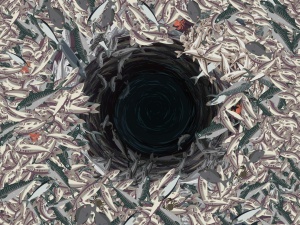New report calls on investors to address the welfare risks in aquaculture
Profits at risk if investors ignore welfare issues around fish mortality and wild-caught fish in aquaculture
A new report from Changing Markets Foundation, Feedback, Coalition for Fair Fisheries Arrangements and Western Sahara Resource Watch warns that profits are at risk if investors do not rapidly address ESG issues in the seafood industry.
The report “Investing in troubled waters: the material risks of fish mortality and the use of wild-caught fish in feed for the aquaculture sector” sets out recommendations on how risks can be mitigated through better farming practices that prioritise fish welfare, and by reducing dependence on wild-caught fish as feed.
The value of the global aquaculture market is projected to reach US$376 billion by 2025. Soaring consumer demand for seafood, coupled with the depletion of wild-fish stocks from overfishing, is often perceived as an attractive target for investment. However, the analysis suggests issues such as fish mortality and wild-caught fish for feed present significant environmental, social, and animal welfare concerns that can affect returns and damage reputation, while also undermining the achievement of Sustainable Development Goals (SDGs).
Alice Delemare Tangpuori, Campaign Manager at Changing Markets Foundation commented: “Investments in aquaculture are in troubled waters. Current unsustainable practices threaten to affect returns and damage reputation, as consumers come to realize the magnitude of fish dying in farms and also how these farms still use billions of wild-caught fish as feed, diverting valuable proteins from African and Latin American countries and damaging ocean ecosystems. Investors should be steering companies to address the risks by placing fish welfare front and centre and eliminating the use of wild-caught fish for feed in aquaculture supply chains.”
High mortality rates are a financial risk
Farm profitability and fish welfare are inextricably linked. Good fish health vs poor fish health can make a difference of 20 percent of the market value of a company, the report finds. Yet the report also states that not a single investor or financial institution has in place robust policies to require the reduction of farmed fish mortality rates, either directly or in their supply chain.
John Willis, Director of Research at Planet Tracker, the financial think-tank, commented: “Aquaculture is a fast-growing industry, sparking significant interest by investors. However, this report shines a light on a number of practices prevalent in the aquaculture sector, notably on poor fish welfare and high mortality rates.”
Reliance on wild-caught fish threatens diminishing returns
Additionally, the aquaculture sector’s continued dependence on wild-caught fish for use in aquafeed represents a systemic and economic threat for companies. Feed is the single largest input cost for fish farmers – between 50 and 70 percent of business expenditure – and higher prices will put more pressure on fish farmers’ margins.
Yet the analysis from Changing Markets Foundation found that no investors or financial institutions have criteria in place requiring a reduction or phase-out of the use of wild-caught fish as feed. 65 percent of investors and financial institutions fail to put in place criteria to ensure no Illegal, unreported and unregulated fishing or other compliance failures occur in their portfolio of investments and lending to the aquaculture sector. Unless the sector’s dependence on wild-caught fish can be abated this represents a risk likely to limit both the growth and profitability of the industry.
Green bonds called out for green-washing
The report calls into question the use of green bonds in aquaculture. There is a huge appetite for debt issued to scale sustainable practices in seafood. However, none of the three companies that have issued a green bond in the aquaculture sector appear to be using the proceeds to take meaningful action on sustainability issues relating to wild-caught fish in feed.
The report also highlights how green bonds can be used to greenwash a company’s image and shines a spotlight on Mowi, the world’s largest seafood producer, as an example. Mowi has pledged a key use of the €200 million EUR proceeds will go to developing sustainable feed and improving fish welfare. However, a closer look reveals the framework relies heavily on the company’s commitment to sign up to weak certification schemes rather than a measurable reduction in farmed fish mortalities or the elimination of wild-caught fish in feed.
Jessica Sinclair Taylor, Head of Policy at Feedback, the campaign group working to regenerate nature by transforming our food system, added: “Mowi has issued a green bond for nothing more than business as usual and this should be challenged by investors. Mowi claims to be a leader in sustainability but has its head in the sand when it comes to the company’s huge and growing reliance on wild caught fish, including fish sourced from fisheries that are already under considerable threat. Meanwhile, high mortalities are a consistent theme on Mowi farms, which is both a welfare problem and a huge waste of fish caught to feed salmon that never make it to our plates.”
Unsustainable aquaculture is hindering the Sustainable Development Goals (SDGs)
The report concludes that, despite the aquaculture sector’s aspirations to improve global food security and relieve pressure on wild fish stocks, it is failing to deliver on this promise. Marketing images might tout farmed fish as a sustainable food with the ability to meet the world’s protein needs, but in reality, industrial aquaculture removes high quality protein and micronutrients from the food chain in one part of the world, usually countries with high levels of food insecurity, and transfers the nutrients to different, often more affluent, markets.
Rather than providing a solution to food security issues, the aquaculture sector is significantly undermining the achievement of SDG 2 – to end hunger and achieve food security – and SDG 14 – to conserve and sustainably use the oceans. Since many investors have committed to supporting the SDGs, they need to act to align their aquaculture investments with these commitments.
Béatrice Gorez, Coordinator, Coalition for Fair Fisheries Arrangements, commented: “The diversion of small pelagic fish from human consumption towards fish feed, undermines food security in the whole West African region and takes away jobs from women fish processors. It is impossible to know whether farmed salmon sold in the EU has been fed with fish coming from West Africa, or even if the fishmeal and fish oil has been sourced legally.”
The analysis of the report was the outcome of in-depth questionnaires with 23 investors and financial institutions. The responses were ranked by those companies that “ignore the issue”, “acknowledge the issue but do not take sufficient measures to address it”, or “acknowledge the issue and takes some measures to address it”. Out of the 23 investors, DNB AM & DNB Liv, Rabobank, NNIP and Triodos IM scored the highest, yet no one company was found to sufficiently address all issues. Almost half of investors (48 percent) including BlackRock, Vanguard Group and APG Asset Management, scored a zero in the rankings.
Recommendations for investors
The combination of high mortalities on farms resulting from poor fish husbandry and growing ecological impacts from the use of wild-caught fish in feed juxtaposed with consumer demand for ethical, environmentally friendly, and high-welfare products are creating financial and reputational risks to the aquaculture industry. Investors in the aquaculture supply chain should instead develop robust policies and engagement practices that require investee companies to:
- Publicly disclose full aquaculture supply chains and provide transparent reporting on key indicators.
- Reduce mortality rates on fish farms. This should include the requirement for monthly reporting on mortality and escape rates from all aquaculture suppliers and early engagement if these numbers seem to be increasing.
- Adopt good fish welfare standards. Changing Markets Foundation recommend using Compassion in World Farming’s species-specific toolkit to set fish welfare standards and reporting indicators.
- Eliminate the use of wild-caught fish in feed for aquaculture by 2025. This should include the requirement for companies to publicly report, or require public reporting from their suppliers, on the composition and origin of feed, and investment in sustainable alternatives.
The full report, “Investing in troubled waters: the material risks of fish mortality and the use of wild-caught fish in feed for the aquaculture sector” can be found here.
– END –
Notes for editors
About Changing Markets | www.changingmarkets.org | @ChangingMarkets
The Changing Markets Foundation was formed to accelerate and scale up solutions to sustainability challenges by leveraging the power of markets. Working in partnership with NGOs, other foundations and research organisations we are working on effective solutions to our ongoing environmental crisis.
Media contact
You might also like...

Fishing for Catastrophe
This report presents damning evidence that the production of fishmeal and fish oil for use in the growing global aquaculture industry is destroying fish stocks, marine ecosystems and traditional livelihoods.

Caught Out: How UK retailers are tackling the use of wild fish in their aquaculture supply chains
This report scores the top 10 UK supermarkets to assess how effectively they are addressing the ocean sustainability implications of the farmed seafood they sell, which remains largely reliant on the use of ...

Krill, Baby, Krill: The corporations profiting from plundering Antarctica
This report investigates the main culprits responsible for the plundering of the cornerstone of the Antarctic food web: krill. Much of the marine life in the Southern Ocean is either a direct predator of ...